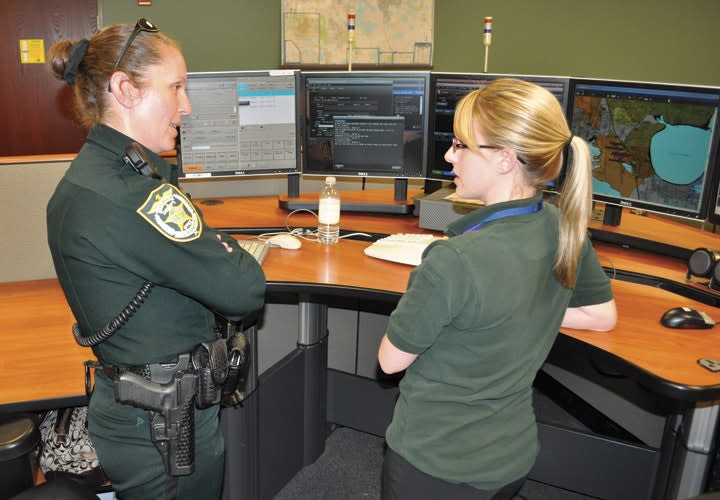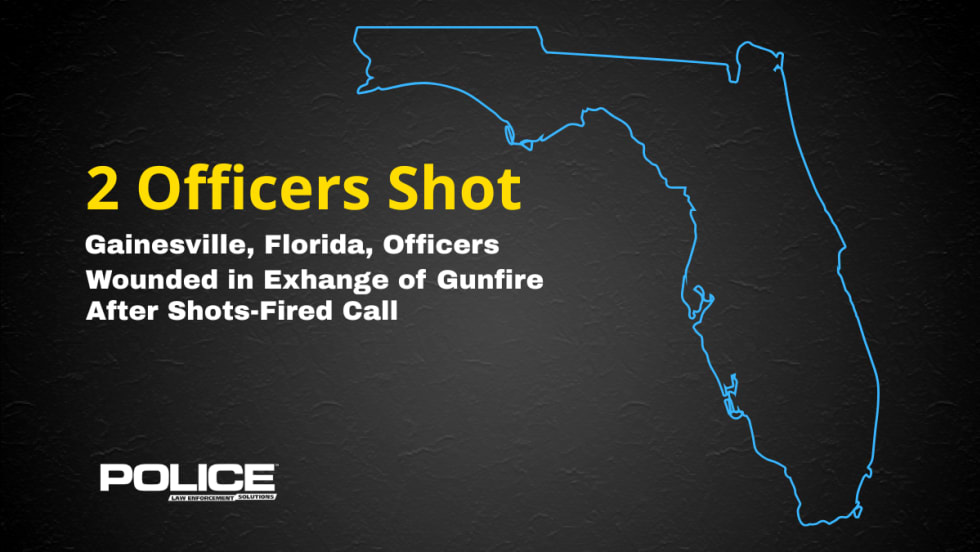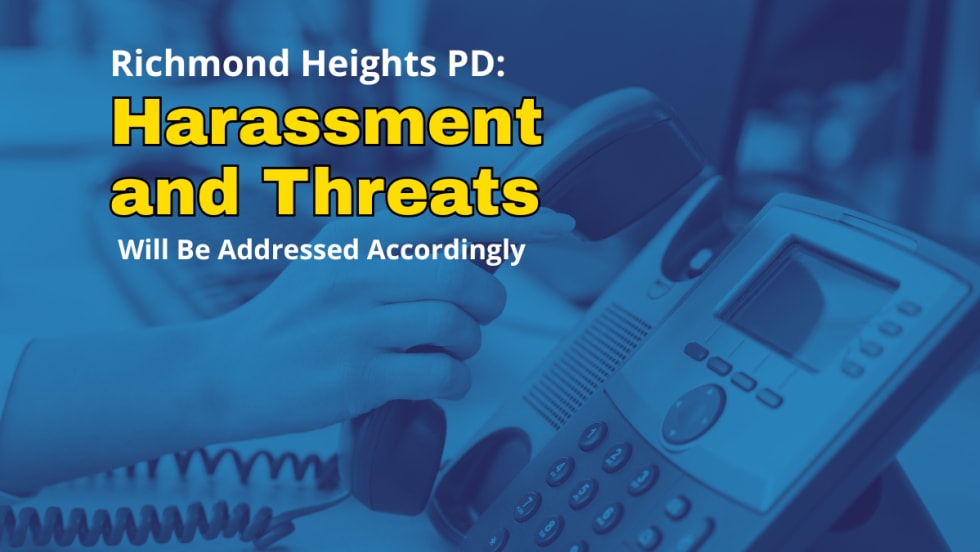The emergency dispatcher is the police officer's lifeline out in the field: coordinating resources, making notifications, running checks, and getting you help when and where you need it. When your butt is on the line, so is theirs.
Minutes after a gunman opened fire at the midnight showing of "The Dark Knight Rises," it became the job of an emergency communications specialist to send help. In a clear, calm voice Kathie Stauffer directed officers, paramedics, and EMTs to the aid of the victims. Afterward, she was praised for helping first responders get the resources they needed to help the wounded and dying and for maintaining professionalism despite great stress and distress. Stauffer's role in the response to the Aurora Massacre is proof of the critical role emergency communication specialists, commonly known as dispatchers, play in public safety.
The emergency dispatcher is the police officer's lifeline out in the field: coordinating resources, making notifications, running checks, and getting you help when and where you need it. When your butt is on the line, so is theirs.
Sometimes the channels of communication are wide open and everything clicks. Information comes through just in time to avert disaster. Suspect descriptions are spot on. Officers speak in perceptible tones and dispatchers return information with lightning speed and accuracy.
But things don't always run as smoothly as both sides would hope. Sometimes external factors—bad radio reception, stepped on transmission traffic, and the inexplicable delay between a request and an answer—make communication less than effective.
Empathy helps. But how many cops have really sat in a dispatcher's shoes and know what it is like to deal simultaneously with both sides of an invisible equation, hearing nothing but voices, reading nothing but text, and having no facial or bodily expression to go off of, and no situational awareness of what is happening beyond their headsets? The stress level for these unsung heroes is tremendously high, for they take their jobs seriously and understand that even minor mistakes can have deadly consequences.
Communication, particularly in law enforcement, is a two-way transmission. With that in mind, here are some things that dispatchers say you can do to help them communicate the critical information that you need in the field.
1. That Lousy Call is Not Their Fault
In larger departments, dispatchers have little or no discretion about which calls they handle. If they get a request for an officer to be sent to a location, they send one. True, they can make alternative suggestions to the caller. And where they are given some latitude, they can screen away some of the extraneous situations with relative ease. The guy who advises that he’s out of toilet paper and asks for an officer to help him is not going to get that help. The woman with the spider in the motel room is also not going to see you. Nor will you be talking to the young woman who wants you to roll on a custody dispute, then identifies the involved father as "Adolph Hitler." Dispatchers use their best judgment to the extent that we are allowed to avert calls that you will never even hear about.
2. Be Patient
Dispatchers are juggling other things. So don't expect them to automatically jump at your beck and call. Cindra Dunaway, state certified public safety telecommunicator/training officer for the Lee County (Fla.) Sheriff's Office, says there can be as high as a 1:40 ratio of dispatchers to field units. "Recognize that there is a lot going on behind the scenes while you are waiting for a response. The informant may be speaking to a 911 operator, who relays that information to me, while I'm typing the information for you," she says. "There may be a politically sensitive issue involved that you may not be aware of, or an officer safety concern that may be dangerous to broadcast. Remember that we're in the same boat as you are: doing more with less. While there may not be as many of us as there once was, we are expected to do more."
3. Let Them Know Where You Are
Dispatchers are your lifeline. But if they don't know where you are, all the cries for help in the world are not going to help you. Let your dispatchers know when and where you are conducting some manner of investigation. Tell them who you are dealing with and clue them in to the nature of the problem. Sometimes that may be enough for a dispatcher to recognize that you need assistance, even if you don't feel comfortable making the request. Dunaway notes that, "We don't know where ‘by the red car' is. Unless you tell us where you are, it makes our job that much more difficult and stressful."
4. Know Your Codes
If the radio code you used while requesting a tow truck actually means fire, don’t blame the dispatcher if you see a bright red engine pull up.
5. Slow Down and Take a Breath
Unless it's an emergency, take your time in relaying information to dispatchers, especially when they have to transcribe your request. Odds are the dispatcher was not a stenographer in a previous life, so save the auctioneer cadence for another time. And remember, most of the time you can run, or you can talk—odds are you can't do both, at least not to the extent that anyone can understand you over a radio. Prioritize and decide what is your true priority: Catching the suspect yourself or coordinating assistance to help you catch him.
6. Know How to Ask Dispatchers for Information
Dunaway says that cops should give her everything they need on a subject in the beginning of their request instead of asking for it piecemeal. "Most of us will drop the information once we give it out and get ready for the next transmission," she says. "Most telecommunicators will give you a hint about how they need information given to them. We have several databases that we work with and each one is different. I consistently get about half of my deputies who give me last name first, even after I ask for first name first. Another thing that bugs us to no end is when there’s more than one unit on scene and both will run the same person."
7. Stick to Business
Many a female telecommunicator has heard it said that she has what is known as "dispatcher voice," a tone that inspires all manner of fantasy. But we're dealing in reality and on the department's dime. Don't try to romance the dispatcher on the job.
8. Show Some Professional Discipline
In emergencies, dispatchers know that you will be responding. Many agencies now have technology that lets them know that you are rolling with lights and siren and where you are rolling from. If such information stands to be redundant, and there is an officer who is trying to put out suspect information or request for paramedics, that's the voice the dispatcher needs to focus on. Please give the dispatcher the opportunity to hear it. Also, dispatchers are aware that you are "running a firearm." If the dispatcher tells you that he or she is on the phone, it may well be because the firearm had been stolen a half-hour before and the dispatcher has the victim on the line. If it is something less substantial, you can hold the dispatcher accountable later. In the meantime, give him or her the benefit of the doubt.
9. Show Some Compassion
Believe it or not, dispatchers care. They are often just as anxious to know what has happened to their fellow public safety employees as you are. If you think about it, let them know how the situation ended. It gives them closure to know who survived and who was sent to jail. Better yet, stop by sometime to let them know when they've done a particularly good job coordinating a broadcast. That really makes their day.
10. Remember Dispatchers Can Help You
If you anticipate the possibility of some complicating presence, let the dispatcher know. If you have a backdrop concern, the dispatcher can contact residents or occupants and have them evacuate a location via a rear door.
Related:













